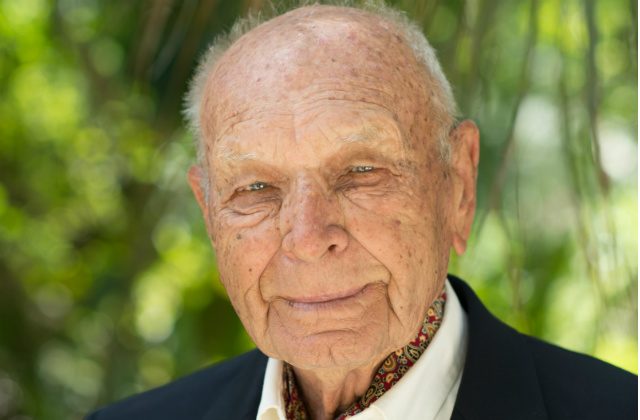SUMMARY
This is AI generated summarization, which may have errors. For context, always refer to the full article.

MANILA, Philippines – “We no longer behaved as human beings and the only thing that helped us survive was one’s instinct for self-preservation. It shows the human can endure more than most animals.”
In these words, Czech national Karel Aster wrote his parents on November 10, 1945, about his experience as a US Army Service volunteer in Manila and as a prisoner of war during World War II.
Aster and 13 other Czech nationals helped Filipino and American troops in fighting Japanese forces in Bataan and Corregidor in the Philippines during World War II.
Seventy years after World War II, 95-year-old Aster lives to tell their story. He is the only one alive among the 14 Czech volunteers back then.
On Thursday, April 23, Czech Ambassador to the United States Petr Gandalovič honored Aster in Florida.
The Czech Republic conferred the Gratias Agit Award on Aster to recognize his heroism during World War II.
In a statement, the Czech Embassy in the Philippines also said he received a Medal of Victory and a Medal of Defense “by order of the Philippine Secretary of National Defense ‘in recognition of his honorable civilian combat service in the Philippines.'”
The Czech Embassy explained that the Gratias Agit Award “is the highest civilian award bestowed by the Czech Minister of Foreign Affairs to acknowledge prominent personalities who have committed themselves to work for the benefit of society, for the promotion of friendship among nations, and for the promotion of the Czech Republic in the world.”
‘Formidable’ motivation
“Karel Aster’s motivation to join the army immediately after the Philippines was bombed in order to stop the advancing armies was formidable,” said Jan Vytopil, deputy head of Czech Embassy in Manila.
When he volunteered to help US troops, Aster worked for the Manila shoemaking facility of Bata Company, a prominent Czech conglomerate.
The Czech Embassy said Aster “ended up in the Cabanatuan concentration camp and later survived the weeks on Japanese hellships where prisoners were held like rats in wretched conditions.”
Aster became a prisoner of war, and was freed “while on forced labor in coal mines in Japan.”
Seven of his fellow volunteers died either during the Bataan Death March in the Philippines or in Japanese captivity.
The Czech Embassy said the Czechs “were the only other nationals that volunteered en masse and took part in the wartime activities beside the Filipino and US troops during the Japanese occupation.” – Rappler.com
Add a comment
How does this make you feel?
There are no comments yet. Add your comment to start the conversation.